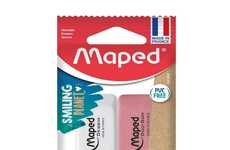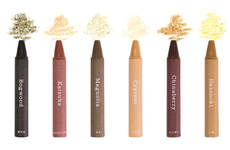
Faber-Castell's Products Focus on Sustainable Alternatives
Elena Rahman — July 5, 2022 — Eco
References: fabercastell & optionstheedge
Faber-Castell's stationery production has been carbon-neutral since 2014 and the brand continues to enhance its sustainable practices through new product innovations. The company uses wood from its own farms to craft its products and has a clear roadmap to reduce the use of plastic.
Plans in Indonesia to collaborate with local companies that gather plastic from beaches and transform it into felt pens have been discussed. In Brazil, the brand uses sugar corn for markers. Moreover, some of Faber-Castell's new products reduce plastic waste like its erasers without plastic wrapping. In addition, the brand's Malaysian market sees highlighters made from recycled plastic sourced from a company in Johor. Faber-Castell continues to increase its presence in the eco-friendly product market.
Image Credit: Faber-Castell
Plans in Indonesia to collaborate with local companies that gather plastic from beaches and transform it into felt pens have been discussed. In Brazil, the brand uses sugar corn for markers. Moreover, some of Faber-Castell's new products reduce plastic waste like its erasers without plastic wrapping. In addition, the brand's Malaysian market sees highlighters made from recycled plastic sourced from a company in Johor. Faber-Castell continues to increase its presence in the eco-friendly product market.
Image Credit: Faber-Castell
Trend Themes
1. Carbon-neutral Stationery - Opportunities for other stationery companies to become carbon-neutral to meet consumer demand for environmentally friendly products.
2. Sustainable Product Innovation - Innovative and sustainable product alternatives can help companies become leaders in the eco-friendly market.
3. Reducing Plastic Waste - Companies can explore alternative materials and packaging methods to reduce plastic waste throughout their production process.
Industry Implications
1. Stationery - The stationery industry can benefit from shifting towards eco-friendly production and materials.
2. Sustainable Manufacturing - Manufacturing industries can follow Faber-Castell's example and adopt sustainable practices to reduce their carbon footprint.
3. Consumer Goods - Companies in the consumer goods industry should explore more environmentally friendly options to align with consumer demand for eco-friendly products.
2.6
Score
Popularity
Activity
Freshness























